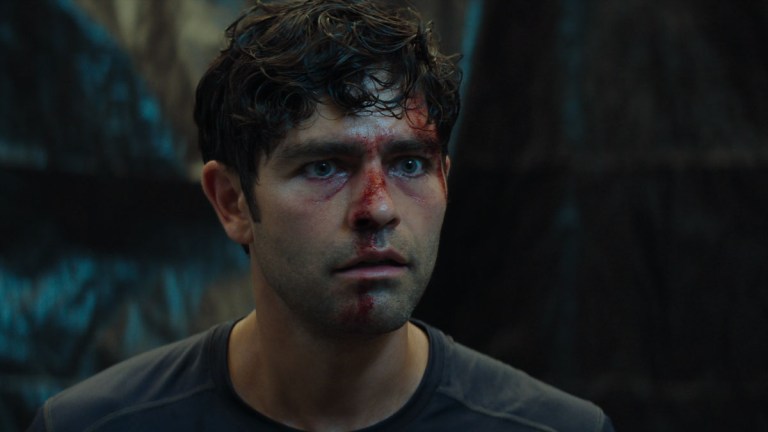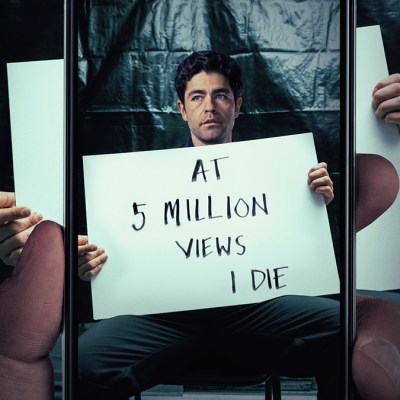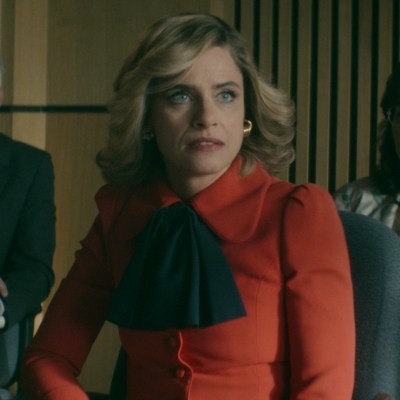Clickbait’s Twist Ending Makes No Sense
Realism rarely intersects with trashy thrillers, but the twist reveal in Netflix’s Clickbait undermines the show’s logic and puts viewers on shaky ground. Spoilers.

Warning: contains spoilers for the Clickbait finale.
Criticising Netflix’s Clickbait for implausibility feels a bit like criticising a branch of McDonalds for not having a Michelin star – it’s missing the point. Of course Clickbait is implausible, it’s a McSpicy with fries, not Beluga caviar. It’s trashy and twisty and formulated to keep us watching until it serves up something shaped like an ending, and then to release us back into our lives with the only lasting impression being, ‘Oh yeah, I watched that. Had the guy from Entourage.’
Clickbait though, is built on such an implausible premise that it verges on insult – to viewers, to the trashy thriller genre, and to anybody who knows what it means to sync a mobile phone. It’s a cyber-mystery with a vaguely judgmental stance on the internet (bad because: snuff videos and revenge porn and catfishing and data harvesting and empty hook-up apps and in this age of mass connection, when did we stop actually connecting?) and a cyber blind spot the size of California, where it’s set – really Australia in disguise.
In episode one, an online video is posted of father-of-two physicotherapist Nick Brewer (the guy from Entourage aka Adrian Grenier) holding signs saying “I abuse women”, and “At five million views I die”. Nick’s loved ones then immediately watch the video so many times that it easily clears the five million mark, and (spoiler) not long afterwards, his corpse is discovered with his head bashed in.
Nick had been kidnapped and put on video by the brother of Sarah, a woman who killed herself six months earlier after being ignored by her online boyfriend. The online boyfriend had irritably told Sarah to follow through on her threat to take her own life, so the brother found him responsible for her death. The brother also thought that Nick was Sarah’s online boyfriend, but he was wrong. Nick didn’t know anything about this woman. She had been catfished by someone who’d set up a fake dating profile using Nick’s photographs. That person was his office receptionist Dawn Gleed (Becca Lish).
Two years before he was murdered, Nick started a new job. Receptionist Dawn Gleed (old and childless, therefore lonely and unfulfilled in a beautiful-people-show like this one) set up his work login, using a password of his choice, and synced his mobile phone to his work computer. While his phone was syncing, a home screen notification came up from dating site D8R. It was a flirtatious message from a woman named Mandy, chasing Nick up after he’d complimented some bikini photos she’d sent him. This was all Nick, remember. Though married, he’d set up a fake profile under the name ‘Nick Chabot’, pretending that he was an architect in San Jose instead of an Oakland physiotherapist, and looked at Mandy’s bikini pics.
Dawn initially looked shocked at seeing the D8R message, but after a bottle of wine at home that night, she used Nick’s password to log in to his D8R account and start messaging Mandy, posing as Nick. Dawn got a taste for it, and this carried on for two years, with multiple women over multiple online dating apps. She would set up new fake profiles using Nick’s photos, message and phone the women using voice-altering software, and then delete the profile and move on to the next app. It was a loneliness-based hobby of hers.
But one that shouldn’t, by rights, have lasted longer than a single night. The day Dawn first drunkenly logged into Nick’s D8R account and started sending and receiving messages, Nick’s mobile phone was synced to his D8R account (which is how Dawn found out about it in the first place). Therefore, every message Dawn sent posing as him on that site that night would also have shown up as an alert on Nick’s phone. Mandy Harrison later confirmed that she and ‘Nick’ exchanged “tons of messages” but never met in person before she ended things, having sensed that something was off.
Even disregarding the home-screen notifications from his supposedly secret dating app (not the smartest adulterer, Nick), the next time Nick logged in to D8R himself, he would have seen the “tons of messages” exchanged with Mandy Harrison. Why did it take him until he was kidnapped two years later to find out that Dawn was using him for her catfish identity? Dawn was using his log-in and password, not one she’d created. Yes, she could have changed the settings and locked him out of the account, and yes, Nick could have set up that fake profile, sent that flirtatious message and then never logged in again, but none of it feels solid as an explanation.
There are other questions, most of which can probably be answered with ‘thriller characters be crazy’. Why the seemingly arbitrary five million view rule for the video? Why did Dawn’s husband nonsensically murder Nick when identity theft was the only charge Dawn was facing at the time? Why did Dawn and her husband then think that kidnapping and – who knows – murdering Nick’s son Kai, who’d followed the trail to their house, was the best way to avoid prison? Why wouldn’t Nick tell his beloved wife Sophie the truth about his dad’s suicide? Why did Sarah Burton use the pseudonym Maggie Oxley in her online dating profile? Why did none of Dawn’s victims – like Emma, who was planning to marry ‘Nick’ and happily used Facetime when his son called her – accept daily phone calls from her online boyfriend but never a video chat?
For that matter, why did Emma still insist that Nick was the kindest, nicest man in the world after she learned he’d been using a fake name and wasn’t called Danny Walters, as he’d told her? Why were Emma and Sarah delighted and not creeped out to receive pictures ‘Nick’ had Photoshopped of themselves with him at the beach? Why did Dawn go to the trouble of inventing fake names for her ‘Nick’ personas, and then tell her victims specific details about his life, including the correct names and ages of his kids and the fact that he attends a specific college team’s women’s volleyball matches? Why, when Sarah’s brother was reading aloud details about Nick’s marriage and volleyball team from her journal was the page she’d written actually about a bird eaten by her cat? Why, why, why?
Why? Some of the above is poetic licence – characters doing stupid, unrecognisable things because it serves the plot. Some of it is more slapdash – perhaps as a result of the added strains of producing television drama during a pandemic. Some of it is less excusable – breaking trust with the viewer and undermining the cast’s good work because it’s more important to keep us guessing and pressing ‘Next Episode’ than it is to provide a payoff that really works. It’s a junk-food thriller after all, look at the title. You can hardly accuse it of false advertising.
Clickbait is available to stream now on Netflix.


